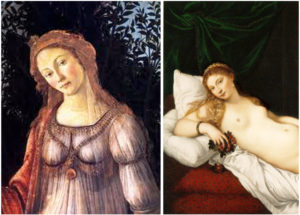 … wars and lechery; nothing else holds fashion: a burning devil take them!
… wars and lechery; nothing else holds fashion: a burning devil take them!
(Troilus and Cressida, act 5, sc. 2)
Forest Grove is a suburb of the (unfortunately) sprawling greater Portland (Oregon). And while America has established (imposed) 140 military bases in Italy, Americans have developed a taste for Italian espresso in their home land. Which is just as well, given that, speaking as a European, the gulping of pints of intensely brown water classified as “American Coffee” seems to me an insult to coffee or alternatively, masochism.
But I digress and let’s return to Forest Grove, where, a few weeks ago and in exquisitely capitalistic spirit, a entrepreneuress opened the second stall of the (presumably hoped to be) sprawling chain of “Dream Girl Espresso”. Which is espresso served at the stall by baristas wearing “pasties” – for our international readers, postage-stamp-sized cloth-snatches applied to nipples and crotch. Actually, they are devices designed more to enhance than conceal, nudity.
That the novelty triggered mixed reaction in the community is interesting and in part understandable. It led to a town hall meeting where the issue was debated.
The opposing party cited the establishment as live pornography and a source of public nuisance. The owner accused the accusers of harassment and slander.
In the end the city attorney said that the bikini baristas do not violate existing laws and revoking their license could cause legal reprisals.
That the Forest Grove town meeting was convened to discuss bikini baristas is in itself interesting. Clearly, the unprecedented, documented, universal surveillance on all citizens by the government – let alone the subversion of the Constitution, the wars, the drones, the victims and the costs – are of lesser import to the local citizenry.
Besides, their complaint about the new establishment smacks of hypocrisy. The bedrock of the capitalist system is ripping your fellow citizen through competition – which includes using sex to lure him into consuming and consumption, directly or by proximal imagination or attraction.
To Dr. Faustus in his study Mephistopheles explains the history of creation and says,
“… And from the monsters, as the play unfolded itself, Man was born, with the power of thought, the knowledge of good and evil, and the cruel thirst for worship. And Man saw that all is passing in this mad monstrous world, that all is struggling to snatch, at any cost, a few brief moments of life before death’s inexorable decree. And Man said, “There is a hidden purpose, could we but fathom it, and the purpose is good; for we must reverence something, and in the visible world there is nothing worthy of reverence.” And man stood aside from the struggle, resolving that God intended harmony to come out of chaos by human efforts.
And when he followed the instincts which God had transmitted to him from his ancestry of beasts of prey, he called it Sin, and asked God to forgive him. But he doubted whether he could be justly forgiven, and he invented a divine plan by which God’s wrath was to have been appeased. And seeing the present was bad, he made it yet worse, that thereby the future might be better.”
Applied to the bikini-baristas of Forest Grove, Goethe’s rendition of the Creation suggests that the girls’ attraction does not consist in their attire. Frankly – some readers may disagree – but Botticelli’s Primavera is more sexy than Titian’s Venus, let alone Venus de Milo, even if the latter had not been deprived of some parts.
The point is that by charging a behavior with sin it acquires the fascination of what we call today the “outside the box”. In fact, if marriage were a sin and divorce produced absolution, very likely the divorce rate would plummet.
Even so, the good burghers of Forest Grove should have pointed to aesthetics more than morals as a motive for their unsuccessful bid to oust the bikini-baristas. The bond between sex and sin is too strong for defeat. After all,
“All this the world well knows yet none knows well
To shun the heaven that leads men to this hell” (SON 129)
In the play. Thersites’ conclusion after observing Cressida and her dealings with Diomed.
